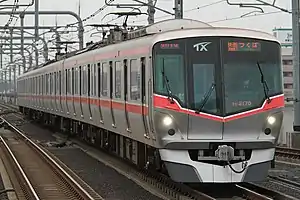| TX-2000 series | |
|---|---|
 Tsukuba Express 2000 series | |
| Manufacturer | Hitachi |
| Built at | Kudamatsu, Yamaguchi |
| Family name | Hitachi A-train |
| Constructed | 2003–2012 |
| Entered service | 24 August 2005 |
| Number built | 138 vehicles (23 sets) |
| Number in service | 138 vehicles (23 sets) |
| Formation | 6 cars per trainset |
| Fleet numbers | 51–73 |
| Capacity | 920 (318 seated) |
| Operators | Metropolitan Intercity Railway Company |
| Depots | Moriya |
| Lines served | Tsukuba Express |
| Specifications | |
| Car body construction | Aluminium |
| Car length |
|
| Width | 2,950 mm (9 ft 8 in) |
| Height | 4,070 mm (13 ft 4 in) |
| Doors | 4 pairs per side |
| Maximum speed | 130 km/h (80.8 mph) |
| Traction system | PWM-VVVF |
| Power output | 190 kW per motor |
| Acceleration | 3 km/(h⋅s) (1.9 mph/s) |
| Deceleration | 4.2 km/(h⋅s) (2.6 mph/s) 4.4 km/(h⋅s) (2.7 mph/s) emergency |
| Electric system(s) | 1,500 V DC / 20 kV AC (50 Hz) |
| Current collector(s) | Overhead wire |
| Safety system(s) | ATC, ATO |
| Track gauge | 1,067 mm (3 ft 6 in) |
The TX-2000 series (TX-2000系) is a dual-voltage electric multiple unit (EMU) train type operated by the Metropolitan Intercity Railway Company on the Tsukuba Express line in the Kanto region of Japan since 2005.[1]
Design
TX-2000 series trains are capable of operating on both the 1,500 V DC and 20 kV AC sections of the Tsukuba Express, and therefore operate over the full length of the line. (The DC-only TX-1000 series sets are restricted to the Akihabara – Moriya section of the line.)[2]
Formation
As of 1 April 2016, the fleet consists of 23 six-car sets (51 to 73), consisting of four motored (M) cars and two trailer (T) cars, and formed as follows with car 1 at the Tsukuba (northern) end.[2]
| Car No. | 1 | 2 | 3 | 4 | 5 | 6 |
|---|---|---|---|---|---|---|
| Designation | CT1 | M1 | M2 | M1' | M2' | CT2 |
| Numbering | TX-2100 | TX-2200 | TX-2300 | TX-2400 | TX-2500 | TX-2600 |
| Capacity Total/seated |
147/48 | 158/51 | 153/60 | 158/51 | 147/48 | |
| Weight (t) | 30.3 | 38.1 | 34.4 | 38.3 | 34.3 | 30.9 |
Cars 2 and 4 are each fitted with two single-arm pantographs.[2]
Interior
The middle two cars, 3 and 4, feature transverse seating bays with folding tables.[2]
 Interior view showing transverse seating
Interior view showing transverse seating Folding table fitted to transverse seating bays
Folding table fitted to transverse seating bays
History
The first six-car prototype was built in March 2003, and 15 more sets were subsequently delivered from Hitachi between January and July 2004, entering service on 24 August 2008.[2] Four additional sets (67 to 70) were delivered in 2008 to provide increased capacity. These later sets differ in having a red bodyline stripe added below the windows.[2]
A further three six-car sets were delivered in June and August 2012 to provide additional capacity.[2][3] These three sets, 71 to 73, feature a number of design improvements over earlier sets, including the use of LED interior lighting, increased seat thickness, and opening windows to provide ventilation at the ends of cars.[4]
From April 2017, the transverse seating in cars 3 and 4 was gradually replaced by longitudinal bench seating.[5]
References
- ↑ Takai, Kunpei (30 June 2014). Morokawa, Hisashi; Hattori, Akihiro (eds.). 全国私鉄超決定版 電車・機関車・気動車1700 [Nationwide Private Railway Ultimate Edition: 1700 EMUs, Locomotives, and DMUs] (in Japanese). Tokyo, Japan: Sekaibunka-sha. p. 66. ISBN 978-4-418-14219-4.
- 1 2 3 4 5 6 7 私鉄車両編成表 2016 [Private Railway Rolling Stock Formations - 2016] (in Japanese). Japan: Kotsu Shimbunsha. 25 July 2016. p. 78. ISBN 978-4-330-70116-5.
- ↑ 3編成18両の車両増強と南流山駅ホーム改良計画について [Details of new build of 3 trainsets and platform improvements at Minami-Nagareyama Station] (PDF). Tsukuba Express News Release (in Japanese). Metropolitan Intercity Railway Company. 11 January 2011. Archived from the original (PDF) on 6 March 2012. Retrieved 12 January 2011.
- ↑ "3 編成18 両(TX-2000 系車両)を導入します。" [Three TX-2000 series sets (18 vehicles) to be introduced] (PDF). Tsukuba Express News Release (in Japanese). Metropolitan Intercity Railway Company. 18 June 2012. Retrieved 20 June 2012.
- ↑ TX-2000系にロングシート改造車が登場 [TX-2000 series modified with longitudinal seating]. Japan Railfan Magazine Online (in Japanese). Japan: Koyusha Co., Ltd. 28 April 2017. Archived from the original on 29 April 2017. Retrieved 29 April 2017.
External links
- Tsukuba Express TX-2000 information (in Japanese)
